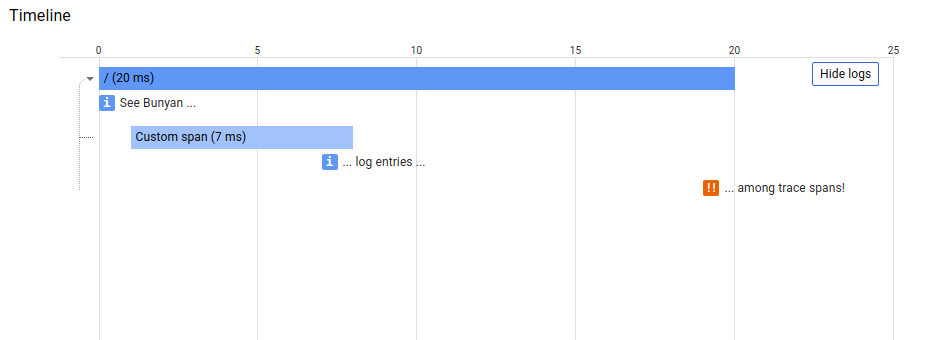This module provides an easy to use, higher-level layer for working with Stackdriver Logging, compatible with Bunyan. Simply attach this as a transport to your existing Bunyan loggers.
- Stackdriver Logging for Bunyan API Reference
- github.com/googleapis/nodejs-logging-bunyan
- Logging Documentation
Read more about the client libraries for Cloud APIs, including the older Google APIs Client Libraries, in Client Libraries Explained.
Table of contents:
-
Select or create a Cloud Platform project.
-
Enable billing for your project.
-
Enable the Stackdriver Logging API.
-
Set up authentication with a service account so you can access the API from your local workstation.
For a more detailed Stackdriver Logging setup guide, see https://cloud.google.com/logging/docs/setup/nodejs.
npm install --save @google-cloud/logging-bunyan
const bunyan = require('bunyan');
// Imports the Google Cloud client library for Bunyan (Node 6+)
const {LoggingBunyan} = require('@google-cloud/logging-bunyan');
// Creates a Bunyan Stackdriver Logging client
const loggingBunyan = new LoggingBunyan();
// Create a Bunyan logger that streams to Stackdriver Logging
// Logs will be written to: "projects/YOUR_PROJECT_ID/logs/bunyan_log"
const logger = bunyan.createLogger({
// The JSON payload of the log as it appears in Stackdriver Logging
// will contain "name": "my-service"
name: 'my-service',
// log at 'info' and above
level: 'info',
streams: [
// Log to the console
{stream: process.stdout},
// And log to Stackdriver Logging
loggingBunyan.stream(),
],
});
// Writes some log entries
logger.error('warp nacelles offline');
logger.info('shields at 99%');Any Error objects you log at severity error or higher can automatically be picked up by Stackdriver Error Reporting if your application is running on Google Cloud Platform. Make sure to add logs to your uncaught exception and unhandled rejection handlers if you want to see those errors too.
You may also want to see the @google-cloud/error-reporting module which provides direct access to the Error Reporting API.
To format your request logs you can provide a httpRequest property on the bunyan metadata you provide along with the log message. We will treat this as the HttpRequest message and Stackdriver logging will show this as a request log. Example:
logger.info({
httpRequest: {
status: res.statusCode,
requestUrl: req.url,
requestMethod: req.method,
remoteIp: req.connection.remoteAddress,
// etc.
}
}, req.path);The httpRequest proprety must be a properly formatted HttpRequest message. (Note: the linked protobuf documentation shows snake_case property names, but in JavaScript one needs to provide property names in camelCase.)
If you use @google-cloud/trace-agent module, then this module will set the Stackdriver Logging LogEntry trace property based on the current trace context when available. That correlation allows you to view log entries inline with trace spans in the Stackdriver Trace Viewer. Example:
If you wish to set the Stackdriver LogEntry trace property with a custom value, then write a Bunyan log entry property for 'logging.googleapis.com/trace', which is exported by this module as LOGGING_TRACE_KEY. For example:
const bunyan = require('bunyan');
// Node 6+
const {LoggingBunyan, LOGGING_TRACE_KEY} = require('@google-cloud/logging-bunyan');
const loggingBunyan = LoggingBunyan();
...
logger.info({
[LOGGING_TRACE_KEY]: 'custom-trace-value'
}, 'Bunyan log entry with custom trace field');Samples are in the samples/ directory. The samples' README.md
has instructions for running the samples.
| Sample | Source Code | Try it |
|---|---|---|
| Quickstart | source code |  |
| Explict Auth Setup | source code |  |
This library follows Semantic Versioning.
This library is considered to be in beta. This means it is expected to be mostly stable while we work toward a general availability release; however, complete stability is not guaranteed. We will address issues and requests against beta libraries with a high priority.
More Information: Google Cloud Platform Launch Stages
Contributions welcome! See the Contributing Guide.
Apache Version 2.0
See LICENSE




